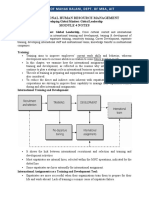0% found this document useful (0 votes)
113 views8 pagesInternational Training: Arpana F. Gawade Dhanashri S
International training and development efforts are especially important for global companies as employees face not only new job responsibilities but an entirely unfamiliar culture, climate, and way of life. Cross-cultural training enables expatriates to learn the norms, values, attitudes, beliefs, and practices of their host country so they can behave appropriately. It provides fact-based information about the country as well as explanations for cultural behaviors. For example, trainees may learn that Japanese people hesitate to say "no" directly to respect others and avoid conflict. With cross-cultural knowledge and awareness, expatriates can transfer what they learn to their behaviors and interactions, leading to greater satisfaction and success in their foreign assignments.
Uploaded by
Any KadamCopyright
© Attribution Non-Commercial (BY-NC)
We take content rights seriously. If you suspect this is your content, claim it here.
Available Formats
Download as PPTX, PDF, TXT or read online on Scribd
0% found this document useful (0 votes)
113 views8 pagesInternational Training: Arpana F. Gawade Dhanashri S
International training and development efforts are especially important for global companies as employees face not only new job responsibilities but an entirely unfamiliar culture, climate, and way of life. Cross-cultural training enables expatriates to learn the norms, values, attitudes, beliefs, and practices of their host country so they can behave appropriately. It provides fact-based information about the country as well as explanations for cultural behaviors. For example, trainees may learn that Japanese people hesitate to say "no" directly to respect others and avoid conflict. With cross-cultural knowledge and awareness, expatriates can transfer what they learn to their behaviors and interactions, leading to greater satisfaction and success in their foreign assignments.
Uploaded by
Any KadamCopyright
© Attribution Non-Commercial (BY-NC)
We take content rights seriously. If you suspect this is your content, claim it here.
Available Formats
Download as PPTX, PDF, TXT or read online on Scribd
/ 8


































































































